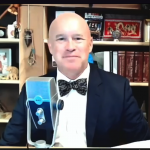Rowena Thursby and MP Norman Baker on the death of weapons inspector David Kelly.
One in four people in the UK polled said they believed that Dr. David Kelly did NOT commit suicide.
===
Dr. David Kelly came to public attention in July 2003 when an unauthorized discussion he had off the record with a BBC journalist, Andrew Gilligan—about the British government’s dossier on weapons of mass destruction in Iraq—was cited by the journalist and led to a major controversy.
Kelly was questioned aggressively about his actions. He was found dead two days later.
Tony Blair’s government set up the Hutton Inquiry, a public inquiry into the circumstances surrounding the death. This determined that Kelly had committed suicide, the pathologist who conducted the postmortem examination giving the cause of death as “hemorrhage due to incised wounds of the left wrist” in combination with “coproxamol ingestion and coronary artery atherosclerosis”.
Lord Hutton also decided that evidence related to the death, including the post-mortem report and photographs of the body, should remain classified for 70 years. In October 2010, Hutton explained that he had done so to protect the wife and daughters of Kelly from the distress of further media reports about the death. “My request was not a concealment of evidence because every matter of relevance had been examined or was available for examination during the public inquiry. There was no secrecy surrounding the postmortem report because it had always been available for examination and questioning by counsel representing the interested parties during the inquiry.”
In 2009 a group of British doctors who had not had access to the evidence—including Michael Powers, a physician, barrister, and former coroner challenged Hutton’s verdict, offering their opinion based on published reports that the cause of death was untenable; they argued that the artery is small and difficult to access, and severing it would not have triggered sufficient blood loss to cause death.
This opinion was challenged by several forensic pathologists, who told The Guardian that the combination of Kelly’s heart disease and the overdose would have meant a smaller loss of blood could have killed him than would be needed to kill a healthier person. In August 2010 the former leader of the Conservative Party, Michael Howard, called for a full inquest, and Dominic Grieve, the Attorney General for England and Wales, confirmed that he was considering re-opening it.
In October 2010, the postmortem—including the pathologist’s 14-page report and the six-page toxicology report—was made public, confirming the conclusion of the Hutton report. Powers continues to maintain that questions remain about the amount of blood found at the scene and the number of pills taken.










Add comment